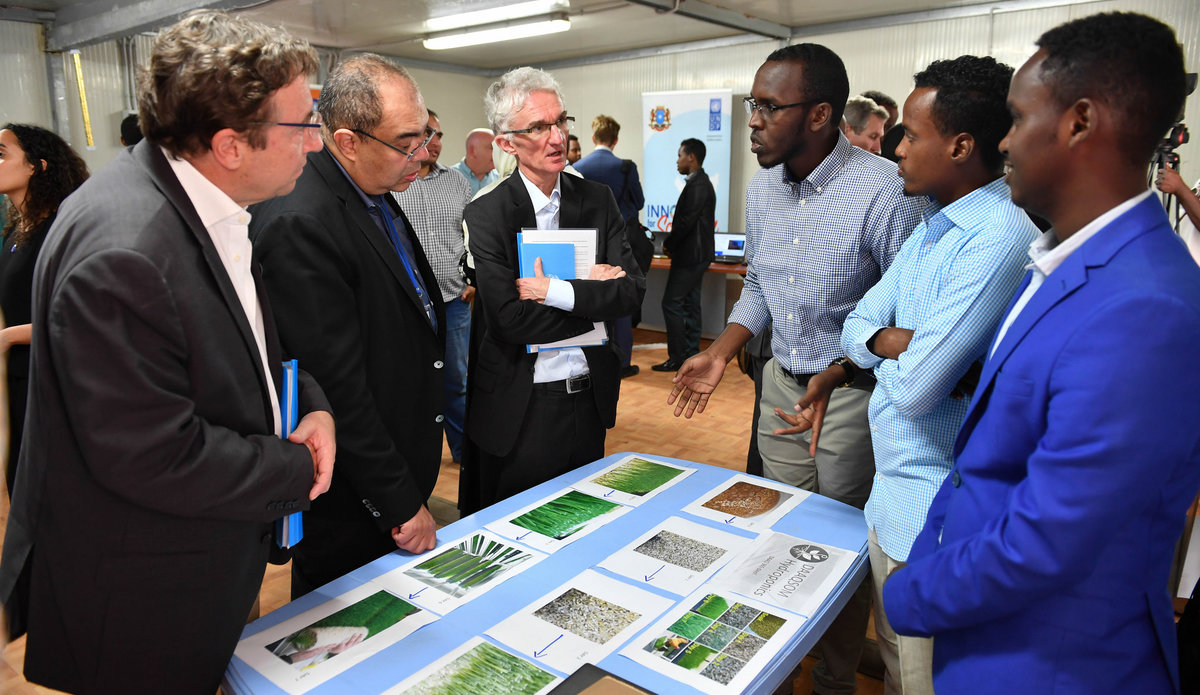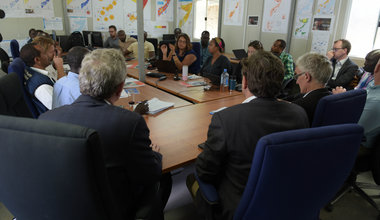Somali government, UNDP and UN-HABITAT launch Innovation Challenge for young people
Mogadishu - Youth in Somalia are being urged to develop solutions for tackling the many problems facing internally displaced persons (IDPs) in their country.
A major “innovation challenge” initiative to seek ideas from young Somalis on improving the living conditions of IDPs was launched today by the Federal Government of Somalia and two UN agencies, the United Nations Development programme (UNDP) and the United Nations Human Settlements Programme (UN-HABITAT).
The challenge is part of an ongoing UNDP-led project dubbed “Innovate for Somalia” in collaboration with the Federal Ministry of Planning, Investment and Economic Development and the Federal Ministry of Trade and Industry. The third of its kind, the new innovation project is open to young Somali IDPs, returnees and young people from host communities.
Top UN officials including the Under Secretary-General and Administrator of the UNDP, Achim Steiner, the Under Secretary-General for Humanitarian Affairs and UN Emergency Relief Coordinator, Mark Lowcock, and World Bank Senior Vice-President Mahmoud Mohieldin expressed their full support for the project during their discussions with young Somalis on the second day of their visit to Somalia.
Youth participants at the camp explained their business ideas to the visiting UN officials and Mr. Mohieldin, which range from online applications and tools, to improved milk processing and livestock feeding techniques.
“No country wants to be reliant on emergency assistance,” Mr. Lowcock told a gathering of young innovators in the capital Mogadishu. “And the only way I can achieve my dream of not being needed anymore (as UN Emergency Relief Coordinator) is if Achim (Steiner) is fantastically successful in helping all of you to be fantastically successful. As far as I am concerned, you are the solution, and good luck,” he remarked.
An official of the federal planning ministry welcomed innovative ideas developed by young Somalis that can address the various social and economic difficulties facing their country.
“We really don’t want to be dependent on humanitarian support. This is the way out, and this is something we can look into,” said the ministry’s resilience coordinator Abdullahi Alas.
Mr. Steiner advised the youth to develop professional networks to promote their innovations. “We do a lot of emergency support. But what we love the most is to work with people like you because if we can succeed with you, to help you to the next level, you will take Somalia to its next level,” he said.
The senior World Bank executive called on young Somalis to maximize the opportunities provided by the government, civil society and Somalia’s development partners under the innovation challenge.
“As the World Bank, we do business with governments directly. But we have a very strong private sector arm, and I am pleased to know from my colleague today that we have a fund of around $10 million dedicated for Somalia to help the start-ups, small and micro enterprises,” noted Mr. Mohieldin.
The inaugural “Innovate for Somalia” camp was held in October 2017, where young people were given the opportunity to pitch their business ideas in order to raise start-up funding. The most viable solutions for improving the living conditions and livelihoods of IDPs will be supported through entrepreneurship trainings, incubation and access to finance.
The senior UN officials and Mr. Mohieldin also visited the Drought Operations Coordination Centre on the final day of their visit to get a briefing on the efforts of UN agencies and local and international non-governmental organizations to meet the needs of millions of Somalis who have been hard hit by the drought.
 UN
UN






